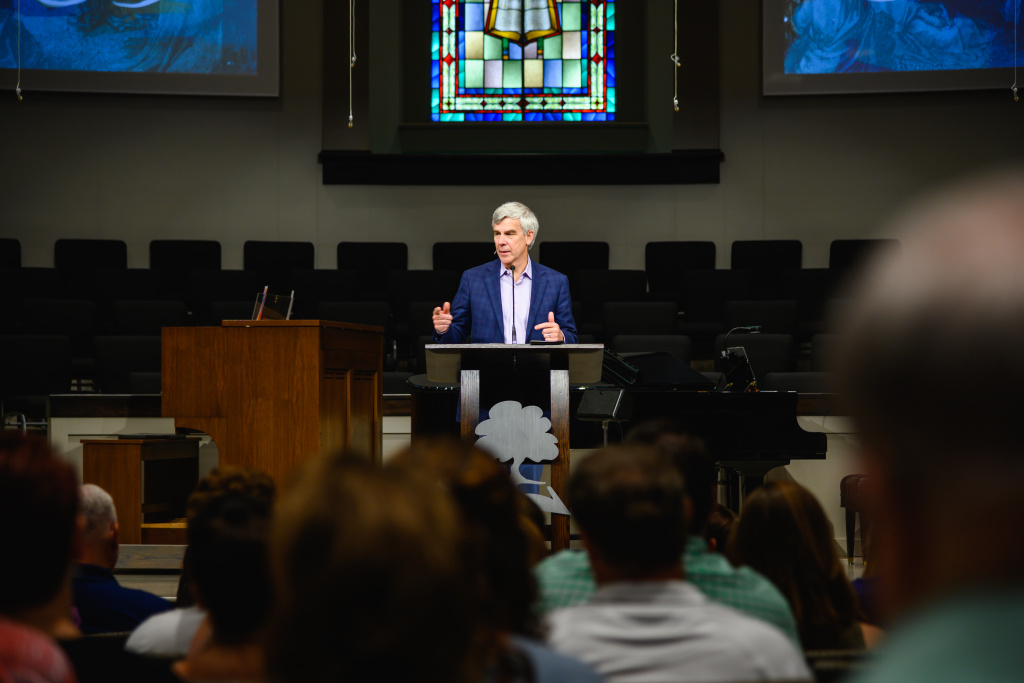COLOSSIANS 3:10–13
And have put on the new man, which is renewed in knowledge after the image of him that created him: where there is neither Greek nor Jew, circumcision nor uncircumcision, Barbarian, Scythian, bond nor free: but Christ is all, and in all. Put on therefore, as the elect of God, holy and beloved, bowels of mercies, kindness, humbleness of mind, meekness, longsuffering; forbearing one another, and forgiving one another, if any man have a quarrel against any: even as Christ forgave you, so also do ye.
Scientific research shows that having a connection to something bigger than ourselves makes us happier and healthier.[1] New York Times columnist David Brooks gave advice to college graduates in a column he wrote entitled, “It’s Not About You.” His conclusion is that “The purpose in life is not to find yourself. It is to lose yourself.”[2] He implies that the most successful people spend time on things bigger than themselves.
A part of Paul’s ministry was to unveil to Gentile believers the fact that they are a part of something bigger than themselves — the church. Paul called the church a mystery. This refers to something hidden in the past but now revealed in the present. Old Testament Jews would not have understood the church. It was Paul whom God gave a stewardship to teach and explain the church. The secret he revealed was that believing Gentiles enter into the blessings of God’s covenant reserved for the Jews through the Gospel. Through the Gospel, they have become fellow heirs and partakers of all of God’s promises (Eph. 3:1–6). Through the Gospel, they have been incorporated into the body of Christ, which is called the church (Col. 1:24). Through the Gospel, all believers are connected to their Head, Jesus Christ. Through the Gospel, they are a part of something far bigger than themselves. So what is the nature of the church? Paul describes it with two powerful metaphors and a common way of life.
The New Creation
COLOSSIANS 3:10
And have put on the new man, which is renewed in knowledge after the image of him that created him:
First of all, the church is the new creation. Paul declares that Jesus is the Author of the created world (Col. 1:15–17). Everything was made by Him and through Him and for Him. He sustains creation by His own power and holds everything together. Like a firstborn son in the ancient world who has the rights and privileges over his Father’s inheritance, Jesus has first place (preeminence) over all creation. He is also the Head over the new creation, the church (1:18). This is a society of men and women who have been supernaturally created through the regeneration of the Holy Spirit.
The new creation is the result of Christ’s deliverance from the fall of Adam. In the Garden of Eden, Adam lived before God in a state of righteousness. However, he acted in disobedience, and the result of his sin was disastrous. His entire nature was transformed. He became a self-centered individual instead of being God-centered. His sin also affected the entire human race. All men now bear the nature of Adam — sinfully depraved and spiritually separated from God. This change has transformed the way we as humans relate to one another. Human society is deeply divided in many ways: language, culture, geography, tradition and religion. Christ, as the second Adam, came to reverse the curse caused by Adam and to create a new society of people. The walls that separated humanity have now been broken down through Christ. God has created a body in which all believers enter and become a part, regardless of one’s background. Christ is all that matters now!
When Jesus becomes everything to everyone, there is the potential of incredible unity in the midst of extreme diversity.
When Jesus becomes everything to everyone, there is the potential of incredible unity in the midst of extreme diversity. His love binds together believers who naturally would hate each other. As the old life with all its prejudices and sin is put off, believers are being united through continual spiritual renewal in the knowledge of Christ. We are a new creation living new lives for a new Master.
The New Israel
COLOSSIANS 3:12
Put on therefore, as the elect of God, holy and beloved, bowels of mercies, kindness, humbleness of mind, meekness, longsuffering.
Secondly, the church bears the marks of the new Israel. God chose Israel and made them His treasured possession. They were not chosen because of any special quality they possessed but simply because God decided to love them (Deut. 7:7–8). Now, these same titles are given to the church through Christ. We are elect, holy, and beloved. Believers have been chosen on the basis of God’s sovereign will (Eph. 1:4–5).
The attribute holy means that the Lord consecrates us. He sets us apart for Himself and His service (Eph. 2:10). Like the nation of Israel, the church is called to reveal by their obedience the character of God and to fulfill His purposes on the earth.
But as he which hath called you is holy, so be ye holy in all manner of conversation (1 Pet. 1:15).
But ye are a chosen generation, a royal priesthood, an holy nation, a peculiar people; that ye should shew forth the praises of him who hath called you out of darkness into his marvellous light (1 Pet. 2:9).
With the designation beloved, Paul reminds us that God has set His love upon us before we chose to love Him (1 John 4:19).
Therefore, the virtues that Paul commands us to put on have everything to do with who we are: a new creation and the new Israel. This is crucial to understand. So often among Christians, character development takes on a self-centered orientation. We pursue it for our own benefit and self-improvement. This was not the way Paul was thinking. He saw these qualities as the way in which the church can give the world a glimpse of the image of God. These were the exact same qualities reflected by God in His relationship with Israel.
WORD STUDY
bowels of mercies — a deep, heartfelt compassion
kindness — displaying gracious acts of kindness for the good of others
humbleness of mind — thinking of others above yourself; not looking to your own interests; serving the needs and interests of others
meekness — not being consumed with one’s self-importance; not rebellious or reactionary, but gentle, mild and patient
longsuffering — enduring mistreatment and faithfully loving others
These are the moral characteristics that believers need in order to act towards others as God has acted towards us. Therefore, Paul commands the Colossians to put on God-like qualities as the church for His name’s sake. So when we talk about putting off and putting on and showing love and shunning sin, we cannot think in terms of requirements to pacify some autocratic God or other people. What should be happening is the sometimes slow but sure transformation of sinners into the new man, the image of Christ Himself.
The New Way of Life
COLOSSIANS 3:13
Forbearing one another, and forgiving one another, if any man have a quarrel against any: even as Christ forgave you, so also do ye.
WORD STUDY
forbearing — suffering, enduring or bearing with; putting up with
forgiving — doing a favor; giving freely and graciously; pardoning
quarrel — a legitimate complaint against anyone
bond — that which binds or bands together
perfectness — completeness; perfect harmonizing of the diverse parts
As we noted earlier in this study, God expects us to live out our identity — to become who we are in Christ. In Colossians 3:13 Paul presents two evidences that we are acting like the church and putting Christlike virtue into action: “forbearing one another, and forgiving one another.”
The first evidence, forbearance, means that we will hold back when provoked and pressured. The present tense of this word tells us that this patience is ongoing and mutual — “for one another.” It is enduring.
Forbearance is different than a worldly tolerance that accepts everyone’s ideas and lifestyles as equally valid. Mutual forbearance is God’s people pursuing the same goal of spreading Christ’s fame — so I desire and choose to be patient, not for my advantage, but for Christ’s.
Forbearance progresses toward the second evidence, forgiveness. There will be times when we have a quarrel or a complaint against another. It is bound to happen, even in a community of believers. The issue Paul is addressing is not the avoidance of friction at all costs. That is impossible in a fallen world. The key is what we do about it. This is not the typical word for forgiveness, but one that especially emphasizes its gracious character. In fact, it comes from the same root as the word grace.
Forgiveness does not give up on justice. The unbelief of Jerusalem and its leaders grieved and righteously angered Jesus. Forgiveness does not mean blindly walking into vulnerable situations just because love covers a multitude of sins. God has not given a pass to that person who ridiculed you or mistreated you.
Nevertheless, forgiveness is crucial to Christian relationships. Paul underscores this point by appealing to the pattern of Christ. He could have said, as the New Testament does in other places, that we should forgive others their debts because God has forgiven us immeasurably greater debts. But here the Holy Spirit breathes out the words even as. We must forgive just like Christ has forgiven. So how did Christ forgive us? We were his enemies, but He took initiative to grant us forgiveness by overcoming evil with good (Rom. 12:21) and canceling our sin debt (Col. 2:14).
Forbearance and forgiveness are tangible expressions that Christ is our life.
We cannot forgive someone’s sins against God, but we can choose not to try to make them pay. And if we believe the debt has been paid, we cannot use it as collateral for our present sin. Past wrongs may have led us down a road of despair or bitterness or self-focus, but if God for Christ’s sake has paid for our sins and theirs, then those wrongs are no excuse for our persisting in sinful patterns. Christ was not satisfied with neutralizing sinners’ evil. He reconciled us to Himself by sacrificing Himself (1:22). He restored the most fractured of relationships. Therefore, it is the true nature of the church to do the same. Forbearance and forgiveness are tangible expressions that Christ is our life.
Notes
[1]Seligman, M.E.P. Flourish: A Visionary New Understanding of Happiness and Well-being (New York: Free Press, 2011), 208.
[2]David Brooks, “It’s Not About You,” New York Times, May 30, 2011.
This post is from Seeking Things Above: A Study in Colossians by Steve Pettit. Copyright 2016 by Bob Jones University.
This post is part of the study designed to correspond with the 2021 Spring Chapel Series. Watch the chapel message below:
Join us for chapel via live webcast at 11 a.m. every Monday.








